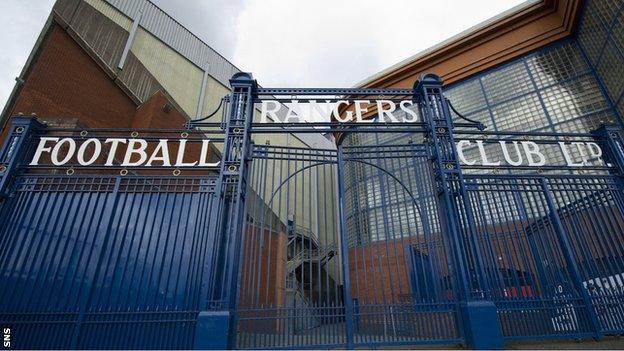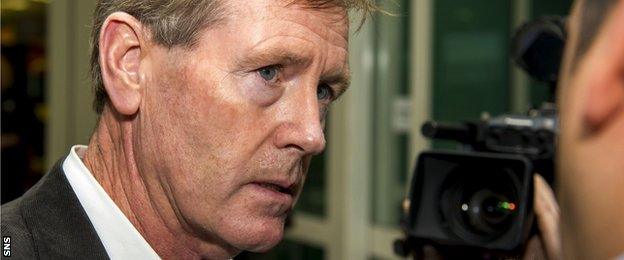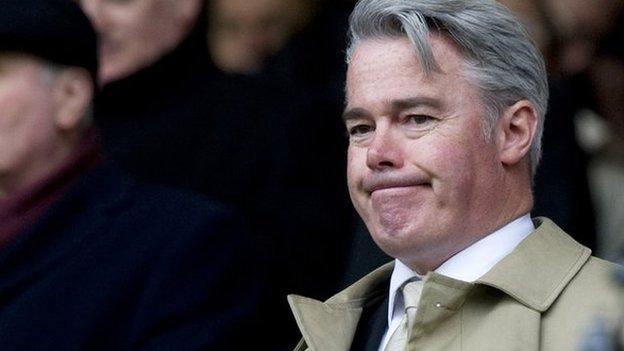Rangers board likely to act soon over dwindling finances
- Published

Financial uncertainty continues to surround Rangers
Timing is critical in events at Ibrox.
The pressure is financial, since paying November's wages is likely to be a problem for the club's directors, but there are familiar complications to address. Principally, they concern how to fund Rangers in the short, medium and long-term and who controls the board.
Dave King's scheduled meeting with members of the board last week, to present a funding proposal that will provide the club with £16m, brought a public focus to discussions that had previously been held in private. Those talks continue, while the board gauges the response of the major shareholders.
King remains in the UK but currently plans to return home to South Africa on Thursday, although the situation is fluid. He also hopes to release a statement outlining the state of play before he leaves.
Richard Wilson |
|---|
"If the directors were to convene a board meeting today, there is only one funding package on the table for them to vote on." |
A £16m funding package for a failing business ought to be a straightforward proposition, but King and the group of fellow Rangers fans who want to provide the investment also want to control how the money is spent. That means running the board, and taking a significant equity stake.
For new shares to be issued, 75% of the shareholders need to vote in favour, which requires at least all of the six major investors to agree to the package. So Laxey Partners, Sandy Easdale, Mike Ashley, Artemis, River and Mercantile and Miton need to balance changes to the boardroom and shareholder dynamic against the necessary and urgent injection of cash.
A solution is likely to be required before the end of this month, given the state of the club's finances, but there is particular uncertainty about how Sandy Easdale - who owns 5.21% of the shares and holds the proxy votes for another 20.94% - and Ashley will view King's offer.
The latter has already called for a general meeting with resolutions for the removal of the chief executive Graham Wallace and the finance director Phillip Nash, who have been the principal negotiators with King and his associates.

Potential Rangers investor Dave King plans to return to South Africa on Thursday
It is a typically dysfunctional situation, since Wallace needs to be in dialogue with Ashley at a time when the Newcastle United owner - who holds an 8.92% stake in Rangers International Football Club plc - is challenging his place on the board. Easdale alone could scupper King, since he controls more than 25%, and some within that grouping have opposed regime change in the past, particularly when it has involved locally-based Rangers-supporting investors.
Yet there is no alternative, at least for now. If the directors were to convene a board meeting today, there is only one funding package on the table for them to vote on.
Some within Ibrox believe that if King's plan were to be rejected, either by the board or shareholders, then Ashley would provide an alternative. He has made no offer, though, and when discussing a previous loan with the board he wanted the rights to the club's trademark, which the directors blocked.
King, with like-minded fans, has provided a potential solution to the club's problems. If the shareholders were to vote against it, there would need to be an alternative or RIFC would face potential administration.
There is likely to be room for manoeuvre in negotiations, although it seems unlikely that King and his associates would soften their stance on taking control of the boardroom, or else they would simply be providing funding for others to spend.
Much, then, depends on Ashley's intentions. While some believe he may want to challenge King for control, there are others who are convinced he only increased his shareholding earlier this month to protect his interests, which centre on a retail agreement that his Sports Direct company signed with Rangers' former chief executive Charles Green.
If Ashley has no plans to provide funding - and he would be restricted to a loan since he has a prior agreement with the Scottish Football Association to not raise his stake above 10% - then the shareholders currently have no alternative but to accept King's offer.
There are several imponderables, not least why there is no indication of an outcome despite King presenting his proposal to members of the board last Tuesday.
The former Rangers director would also require approval from Daniel Stewart, the RIFC nominated advisor, and the SFA if he was to join the plc board. King has always been adamant that neither of those requirements would prove an impediment, but he could proceed with his proposal without sitting on the board himself.
In theory, King's funding package would bring stability to a club beset with financial concerns and that lost 15,000 season ticket holders last summer.
For shareholders, that would most likely reset a share price that has been on a downward spiral, and for Ashley's retail agreement, there is likely to be more merchandise bought by fans who would feel more content with Rangers-supporting figures in charge at the club.
Yet so far, a conclusion is still out of reach.
- Published20 October 2014

- Published9 October 2014

- Published8 October 2014

- Published7 June 2019
